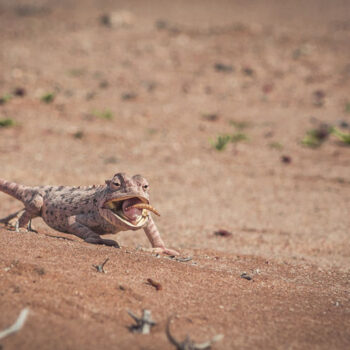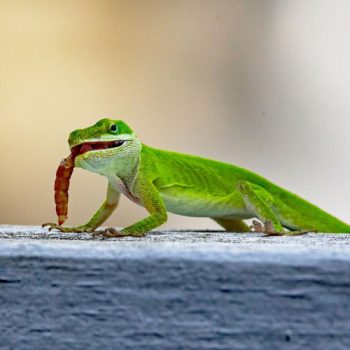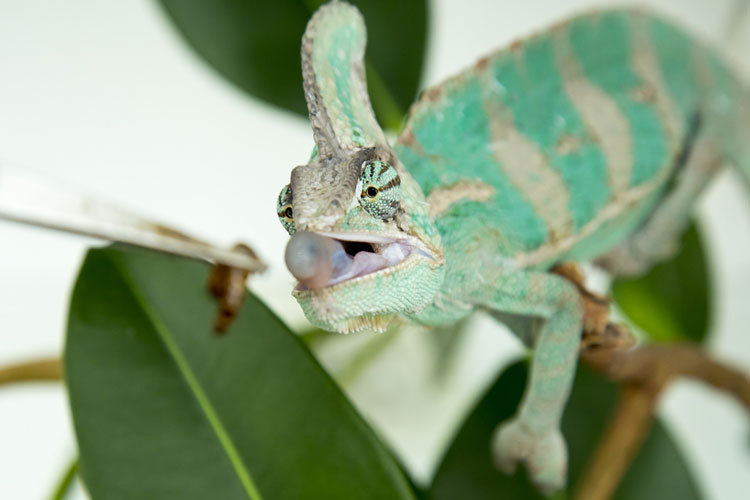
Protein Powerhouse: Protein-Rich Diet for Chameleons
Chameleons are fascinating creatures known for their unique ability to change colors and their intricate hunting techniques. As insectivorous reptiles, chameleons require a diet rich in nutrients to maintain their health and vibrant colors. One excellent addition to their diet is mealworms – small, wriggly insects that offer numerous benefits to these enchanting reptiles. In this blog, we will explore the advantages of feeding mealworms to chameleons and why they make a nutritious and delicious treat for these captivating creatures.
- Protein-Rich Diet
Chameleons, like all reptiles, are carnivorous and rely on a diet high in protein to support their growth, muscle development, and overall health. Mealworms are an excellent source of protein, containing about 20% to 25% of this essential nutrient. This makes them an ideal choice for providing chameleons with the energy they need for daily activities and maintaining their active lifestyles.
- Balanced Nutrition
In addition to protein, mealworms offer a well-rounded nutritional profile for chameleons. They are also rich in fat, essential fatty acids, and fiber. The combination of these nutrients helps support healthy skin, scales, and organ function, contributing to the overall well-being of these captivating reptiles.
- Vitamin and Mineral Content
Mealworms are not only protein-packed but also loaded with essential vitamins and minerals. They contain B vitamins, which play a vital role in energy metabolism, nervous system function, and cell health. Additionally, they are a source of minerals like calcium and phosphorus, promoting strong bones and overall skeletal health in chameleons.
- Hydration Source
Chameleons have specific hydration needs, and obtaining water through their diet is essential, especially in captivity. Mealworms have a relatively high moisture content, making them a valuable source of hydration for chameleons. This helps ensure that these reptiles stay properly hydrated, reducing the risk of dehydration-related health issues.
- Stimulates Natural Hunting Behaviors
Feeding mealworms to chameleons can stimulate their natural hunting instincts. In the wild, chameleons use their exceptional eyesight and lightning-fast tongues to catch insects as they move about their environment. Introducing live mealworms as part of their diet in captivity allows them to express these natural behaviors, promoting mental and physical stimulation.
- Easy to Digest
Mealworms have a soft exoskeleton, making them relatively easy for chameleons to digest. Their small size is also suitable for chameleons of different ages and sizes, ensuring that all individuals can benefit from their nutritional value.
- Variety in Diet
Variety is essential when it comes to feeding chameleons. A diverse diet helps ensure they receive a broad spectrum of nutrients necessary for their well-being. By incorporating mealworms into their diet along with other insect types (crickets, roaches, waxworms, etc.), you provide your chameleon with a balanced and exciting feeding experience.
Sunshine State Worms
Mealworms are undoubtedly a valuable addition to the diet of chameleons. Their rich protein content, balanced nutrition, essential vitamins, and minerals make them a nutritious and wholesome treat for these captivating reptiles. Not only do mealworms support chameleons’ growth and overall health, but they also promote natural hunting behaviors and mental stimulation. As with any aspect of your chameleon’s care, it is essential to feed mealworms in moderation and in combination with other insects to ensure a varied and well-balanced diet. By providing your chameleon with this delectable and nutritious snack, you contribute to their longevity, health, and the fulfillment of their natural instincts as fascinating insectivorous creatures. Visit Sunshine State Worms online shop here!
Post Views: 519
Recent Posts
Recent reviews
-
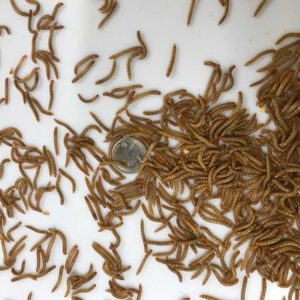 3/4" Medium Mealworms
Rated 5 out of 5by Sara Harden
3/4" Medium Mealworms
Rated 5 out of 5by Sara Harden -
 3/4" Medium Mealworms
Rated 5 out of 5by Kat Breedlove
3/4" Medium Mealworms
Rated 5 out of 5by Kat Breedlove -
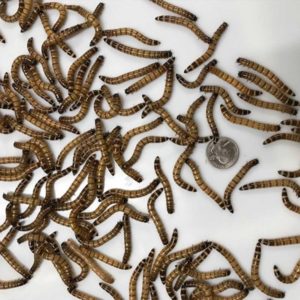 1.25-2" Large Superworms
Rated 5 out of 5by Danielle
1.25-2" Large Superworms
Rated 5 out of 5by Danielle
Tags
bearded dragon food
chameleons
crickets
crickets for sale
feeder insects
feeders for reptiles
fishing bait
gut-loading
hornworms
inspect live worms
live crickets
live crickets for sale
live feeders
live feeder worms
live worms for sale
mealworm
mealworm casting
mealworm castings
mealworms
mealworms castings
mealworms castings for sale
mealworms for birds
mealworms for chameleons
mealworms for reptiles
mealworms for sale
online worms for sale
pet nutrition
pet reptile food
protein for reptiles
reptile diet
reptile diet tips
reptile feeders
reptile food
reptile food for sale
reptile health
reptile nutrition
shipping feeder insects
snack for birds
Sunshine State Worms
superworms
superworms for reptiles
superworms for sale
superworms nutrition
worms for reptiles
worms for sale

